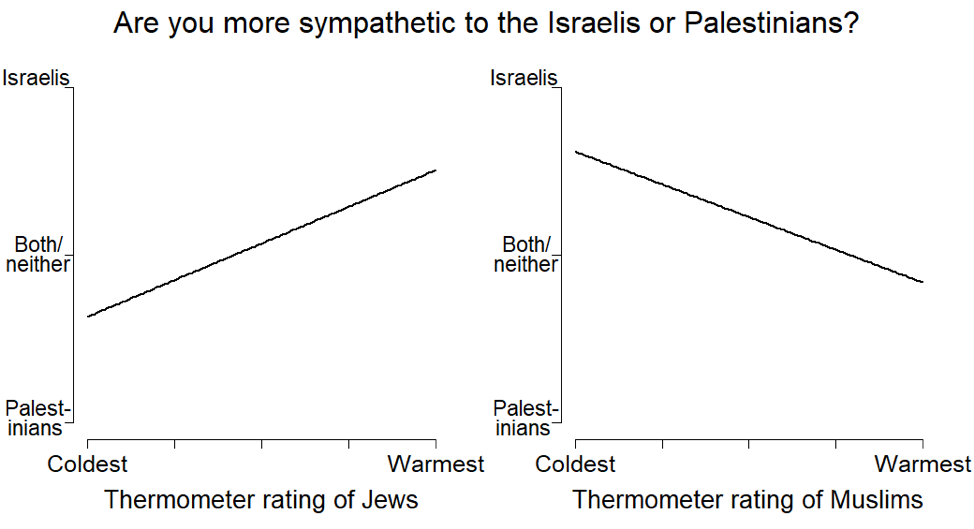Editors’ note: In this archival piece, Good Authority contributor Michael Tesler explains how closely Americans attitudes about Jews and Muslims are linked to their attitudes toward Israel. It was originally published on March 11, 2019, after Rep. Ilhan Omar made some controversial remarks.
Rep. Ilhan Omar’s (D-Minn.) sparked a storm of controversy this past month by lamenting the financial influence of the pro-Israel lobby and their “allegiance to a foreign country.”
Those remarks were criticized by Republicans and some prominent Democrats, who saw them as playing into pernicious anti-Semitic tropes of Jewish money subverting societies and Jews being unpatriotic citizens who cannot be trusted. President Trump called on Rep. Omar to resign and later branded Democrats as the “anti-Israel” and “anti-Jewish” party.
But many see a double standard here — especially because the president has trafficked in negative stereotypes about Jews. Some argue that bias against Muslims is fueling the criticisms of Omar, who is one of only two Muslim women in Congress. Rep. Omar has had her loyalty to the U.S. questioned by Republican colleagues and Fox News commentators; she was even linked to the 9/11 terrorist attacks by Republicans in the West Virginia statehouse.
In response to concerns about anti-Semitism and anti-Muslim bias in the debate about Ilhan Omar, the House of Representatives overwhelmingly passed a resolution condemning both anti-Semitism and anti-Muslim discrimination “as hateful expressions of intolerance that are contrary to the values and aspirations of the United States.”
This debate also raises important questions about the role of anti-Semitism and bias against Muslims in public opinion and dialogue about Israel. What surveys show is that whether and how much Americans support Israel is linked to their views of both Jews and Muslims.
Anti-Semitism and anti-Muslim bias in public opinion about Israel
One way to assess the role of anti-Semitism and anti-Muslim bias in public opinion is to ask people how they feel about Jews and Muslims. Academic surveys often measure this by asking people to rate various social groups on a thermometer scale that ranges from 0-100, where 100 is the warmest feeling.
In the 2016 American National Election Study (ANES), the average thermometer rating for Jews was a favorable 71 degrees, but there was a range of opinion; about one-third of respondents rated Jews 50 degrees or lower. The average rating for Muslims was a chillier 54 degrees. These results are consistent with several other surveys showing that on average Americans rate Jews much more favorably than Muslims.
When asked about their attitudes about Israel, people’s feelings about both Jews and Muslims appear to matter. The 2016 ANES asked whether the U.S. was too supportive of Israel, not supportive enough, or supportive at the right level. Americans were evenly split on this question: About one-quarter said the U.S. is too supportive of Israel; one-quarter said the U.S. is not supportive enough, and half thought that U.S. support is about right.
The graph below shows that the more favorably people felt about Jews, the more likely they were to say that the U.S. is not supportive enough of Israel. Meanwhile, the more favorably they felt toward Muslims, the more likely they were to say the opposite — that the U.S. was too supportive of Israel.

Note: Relationships control for thermometer ratings of Muslims (right-hand panel) and thermometer ratings of Jews (left-hand panel).
In a different survey, the 2012 Cooperative Campaign Analysis Project, respondents were asked whether they were more sympathetic to Israelis or Palestinians. Far more Americans in the 2012 survey primarily sympathized with the Israelis over the Palestinians (32 percent to 7 percent respectively).
The graph below shows the same pattern as the first graph. Americans with favorable views of Jews tend to be more sympathetic to Israelis while people with less favorable views of Jews tend to be more sympathetic to Palestinians. Americans with more favorable views of Muslims are less likely to sympathize with the Israelis over the Palestinians.

Note: Relationships control for thermometer ratings of Muslims (right-hand panel) and thermometer ratings of Jews (left-hand panel).
Of course, these results are only capturing tendencies. Attitudes toward Israel cannot simply be reduced to feelings about Jews or Muslims. Thus, concern about U.S. support of Israel or sympathy for Palestinians is hardly synonymous with anti-Semitism — as several Jewish Americans have recently noted. Similarly, support for Israel does not by itself imply hostility to Muslims as a group.
What this means for the Omar controversy
But the significant relationships between views of Muslims and views of Israel does suggest that there will often be a stronger backlash against Muslim Americans who criticize Israel than there would be against non-Muslims. As Rep. Omar put it, “a lot of our Jewish colleagues, a lot of our constituents, a lot of our allies, [think] that everything we say about Israel [is] anti-Semitic because we are Muslim.”
Indeed, the widespread nature of anti-Muslim sentiments mean that many are quick to attribute bad-faith motives to Muslims. Prejudiced people tend to think that the groups they dislike are the ones who are really prejudiced.
Republican politicians, in particular, can score political points with their base by harshly criticizing Omar: In polls, a majority of Republican voters say they wouldn’t vote for an otherwise qualified Muslim candidate for president, rate Muslims and Islam unfavorably, and think the Islamic faith is incompatible with American values.
What these surveys show, then, is that our national conversation about Israel has to keep both anti-Jewish and anti-Muslim sentiments in mind. The significant correlation between views of Jews and views about Israel makes it all the more problematic when anti-Semitic stereotypes are used in the context of criticizing Israel.
But views of Israel cannot be easily disentangled from views of Islam, either. The backlash against Ilhan Omar may therefore be rooted in an anti-Muslim double standard.



